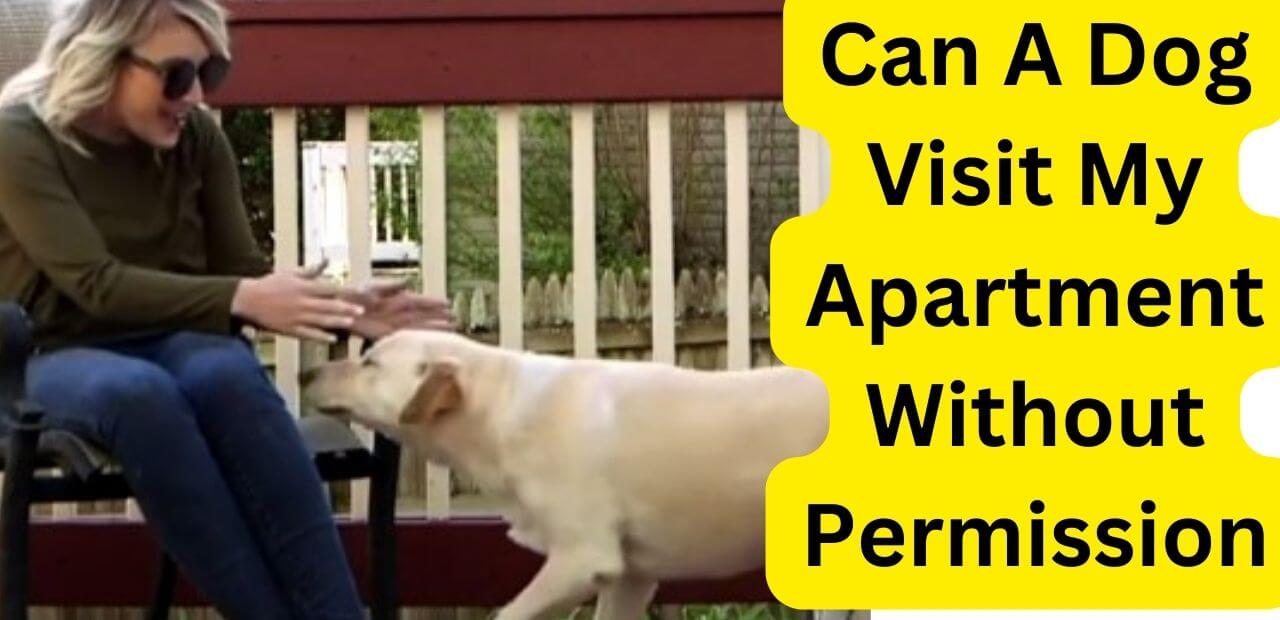No, a dog cannot visit your apartment without permission. It is essential to get permission before bringing a dog into the apartment.
Are you wondering if a dog can visit your apartment without permission? The answer is no. Before bringing a dog into your apartment, it is essential to obtain permission from the landlord or property management.
This is because some apartments have pet policies in place that restrict or regulate the presence of pets, including dogs.
By seeking permission beforehand, you ensure compliance with the apartment rules and maintain a harmonious living environment for yourself, your neighbors, and your pet.
So, if you’re considering getting a dog or having one temporarily visit, make sure you obtain permission first to avoid any potential issues later on.
The Legalities Of Dogs Visiting Apartments
When it comes to allowing dogs to visit your apartment, it’s essential to understand the legalities involved. As a responsible pet owner, it’s crucial to respect your landlord’s rights and rules regarding pets.
Additionally, it’s important to be aware of any exceptions for certified service dogs. By reading and understanding your lease agreement thoroughly, you can ensure that your furry friend can visit your apartment without causing any legal issues.
Understanding A Landlord’s Rights And Rules Regarding Pets
As a tenant, it’s essential to recognize that your landlord has the right to establish rules and regulations regarding pets in your apartment building.
These rules are put in place to maintain a safe and harmonious living environment for all residents.
Before allowing your dog to visit your apartment, review your lease agreement carefully to determine if pets are allowed, or if there are any restrictions or limitations regarding their presence.
Some common rules that landlords may enforce include:
- No pets allowed
- Weight or size restrictions on pets
- Breed restrictions
- Additional pet deposits or fees
- Requirements for pet registration and documentation
By following these rules, you can maintain a good relationship with your landlord and avoid any potential legal consequences.
However, in some cases, there may be exceptions for certified service dogs.
Exceptions For Certified Service Dogs
While landlords may have restrictions on pets, they are generally required to make reasonable accommodations for individuals with certified service dogs.
Service dogs are specifically trained to assist individuals with disabilities and are protected by the Americans with Disabilities Act (ADA).
If you have a certified service dog, it’s essential to inform your landlord about your furry companion and provide any necessary documentation or certification.
Landlords cannot deny individuals with disabilities the right to have a service animal in their apartment, even if there are pet restrictions in place.
However, it’s crucial to note that the service dog must be well-behaved and not pose a threat to the safety or well-being of other tenants.
The Importance Of Reading And Understanding The Lease Agreement
When it comes to dogs visiting your apartment, it cannot be stressed enough how crucial it is to read and understand your lease agreement.
The lease agreement serves as a legal contract between you and your landlord, outlining your rights and responsibilities as a tenant.
Pay close attention to any clauses or provisions related to pets or animals in the lease agreement. These clauses may specify whether pets are allowed, any restrictions on breed or size, and additional fees or deposits required for pet ownership.
By understanding these terms, you can ensure that you are in compliance with the lease and avoid any potential legal disputes.
Before allowing a dog to visit your apartment, it’s important to familiarize yourself with the legalities surrounding pets.
Understand your landlord’s rights and rules, be aware of exceptions for certified service dogs, and thoroughly read and comprehend your lease agreement.
By doing so, you can ensure a peaceful and enjoyable living experience for yourself, your pet, and your neighbors.
Assessing The Potential Risks Of Allowing Dogs

Before allowing a dog to visit your apartment without permission, it is important to evaluate the potential risks involved.
While welcoming a furry friend can be a delightful experience, it is crucial to consider several aspects as a responsible pet owner or landlord.
Assessing the potential risks can help you make an informed decision that ensures the safety, well-being, and harmony of everyone involved.
Evaluating Potential Damage To Property And Belongings
One of the primary concerns when allowing dogs into your apartment is the potential damage they may cause to your property and belongings.
Dogs, especially if untrained or unsupervised, can be prone to chewing on furniture, scratching doors and walls, or having accidents inside.
These incidents can result in expensive repairs or replacements, leading to additional costs for both tenants and landlords.
Take cautionary measures to protect your property and belongings:
- Provide appropriate toys and chew items, redirecting their attention from destructive behaviors.
- Consider crate training or confining the dog to a designated area when unattended.
- Invest in pet-friendly furniture covers and scratch-resistant materials to minimize potential damage.
- Set clear expectations and guidelines for tenants on responsible pet ownership.
Considering Noise Disturbances And Neighbor Complaints
Another important factor to consider is the potential noise disturbances that may arise from having dogs in your apartment building.
Excessive barking, whining, or howling can disrupt the peace and tranquility of your neighbors. Complaints from other tenants about noise disturbances can lead to tension and potentially strained relationships.
To mitigate noise disturbances and neighbor complaints:
- Ensure proper training and socialization of the dog to minimize excessive barking.
- Encourage tenants to address and resolve any behavioral issues promptly.
- Establish clear guidelines on quiet hours and enforce noise regulations.
- Promote open communication between tenants to address any concerns or conflicts.
Liability Concerns In Case Of Accidents Or Injuries
One must also consider the potential liability risks in case of accidents or injuries caused by dogs visiting the apartment without permission.
Dogs, regardless of their size or temperament, may unintentionally cause harm to others or damage neighboring properties. In such unfortunate events, the landlord or pet owner may be held liable for any resulting damages or medical expenses.
To mitigate liability concerns and ensure the safety of everyone involved:
- Require tenants to have liability insurance that covers any potential dog-related incidents.
- Request a dog’s vaccination and health records to ensure they are up-to-date and well-maintained.
- Encourage responsible pet supervision to minimize the risk of accidents.
- Implement rules and regulations, such as leash requirements, to prevent pet-related incidents.
Establishing Pet Policies For Apartment Communities
Establishing pet policies for apartment communities is an important aspect to consider for both tenants and landlords.
With the growing popularity of pets, it’s essential to have clear guidelines and rules in place to ensure a harmonious living environment for everyone.
Common Pet Policies And Guidelines For Apartment Complexes
Apartment complexes often have specific pet policies and guidelines to maintain a safe and comfortable living environment for all residents.
These policies may vary from one community to another, but there are some common rules that are typically implemented:
- Restricted dog breeds: Some apartments may have a list of restricted dog breeds due to their size, temperament, or potential threat to other residents.
- Weight restrictions: Many apartment complexes set weight limits for dogs to ensure they are suitable for the available space and infrastructure.
- Pet deposits and fees: Landlords may require pet deposits or additional monthly fees to cover any potential damages caused by pets.
- Leash and waste policies: Tenants are often required to keep their dogs leashed and clean up after them to maintain a clean and hygienic environment.
- Noise restrictions: Apartments typically have noise restrictions in place to prevent disturbances caused by barking dogs. It may be necessary to address any excessive noise issues promptly.
The Importance Of Notifying Your Landlord About Adopting A Dog
If you are considering adopting a dog for your apartment, it is crucial to inform your landlord or property management company.
Notifying them not only shows your respect for the rules but also ensures that you are adhering to the terms of your lease agreement.
Here are a few reasons why notifying your landlord is important:
- Avoiding lease violations: Many lease agreements explicitly state that pet ownership without prior approval can result in lease violations and potential consequences.
- Gaining permission: Communicating with your landlord allows you to seek permission for owning a dog, ensuring compliance with the apartment’s pet policies.
- Providing necessary documentation: Your landlord may require documentation such as pet registration, vaccination records, or proof of pet liability insurance to ensure the safety and well-being of all residents.
- Resolving conflicts: By informing your landlord in advance, you can help to prevent any conflicts that may arise from unexpected pet ownership.
Pet-related Rules And Regulations That May Apply
In addition to the specific pet policies established by apartment complexes, there may be additional rules and regulations that apply depending on your location.
These regulations are usually put in place by local authorities and may cover aspects such as licensing, leash laws, and vaccination requirements for dogs.
It is important to familiarize yourself with these rules to ensure you are in compliance with the law.
Steps To Ensure A Smooth Transition For Your Dog

Introducing a dog to a new apartment can be both exciting and challenging. While dogs can adjust well to new environments, it’s important to take the necessary steps to ensure a smooth transition for your furry friend.
Properly introducing your dog to the apartment environment, addressing behavioral issues, and establishing a routine are key factors in creating a happy and comfortable living situation.
In this article, we will explore these steps in detail.
Properly Introducing Your Dog To The Apartment Environment
When bringing your dog to a new apartment, it’s crucial to make the introduction as comfortable as possible.
Here are some steps you can take to help your dog adjust:
- Start by creating a designated space for your dog, such as a cozy corner or a crate. This will give your dog a sense of security and a place to retreat to.
- Gradually introduce your dog to different areas of the apartment. Start with a few rooms and gradually increase the space over time. This will help your dog feel more comfortable exploring their new surroundings.
- Ensure that your apartment is dog-proofed, removing any potential hazards such as toxic plants, electrical cords, or small objects that could be swallowed.
- Provide familiar items from the previous living space, such as their bed, toys, and blankets. Having familiar scents will help your dog feel more at ease.
Tips For Addressing Behavioral Issues And Ensuring Good Behavior
As your dog adjusts to the new apartment, you may encounter behavioral issues. Here are some tips to address and prevent such issues:
- Consistency is key – establish clear rules and boundaries for your dog from the beginning. This will help them understand what is expected of them in the new environment.
- Positive reinforcement is an effective training method. Reward good behavior with treats, praise, or playtime to encourage your dog to repeat that behavior.
- If your dog exhibits any unwanted behavior, such as excessive barking or chewing, address it immediately. Redirect their attention to an appropriate activity and provide them with plenty of mental and physical stimulation.
- Consider enrolling in obedience training classes or seeking the help of a professional dog trainer if you need further assistance in addressing behavioral issues.
Establishing A Routine To Keep Your Dog Happy And Comfortable
Creating a routine is essential for your dog’s well-being. Dogs thrive on consistency, and it helps them feel secure in their new environment. Here are some tips for establishing a routine:
- Stick to a regular feeding schedule to help regulate your dog’s digestion and prevent accidents.
- Designate specific times for walks and exercise, ensuring your dog gets the physical activity they need.
- Set aside dedicated playtime each day to bond with your dog and provide mental stimulation.
- Don’t forget to allocate time for bathroom breaks, especially during the initial transition phase when your dog is still adapting to the new environment.
By following these steps, you can help your dog adjust to the new apartment and create a comfortable and happy living situation for both of you.
Remember, patience and consistency are key during the transition period. With time, your dog will feel right at home.
Addressing Neighbor Concerns And Building Good Relationships

When you have a furry friend in your life, it’s only natural to want them to visit your apartment and bring joy to your day-to-day activities.
However, it’s essential to consider your neighbors and build good relationships with them to ensure a harmonious living environment.
We’ll explore techniques to address neighbor concerns effectively and foster a sense of community in your apartment complex.
Communicating With Neighbors About Your Dog’s Presence
Effective communication is key when it comes to addressing neighbor concerns about your dog visiting your apartment. By openly discussing your intentions with your neighbors, you can establish a sense of trust and transparency within the community. Consider these tips when engaging in conversation:
- Initiate a friendly discussion: Approach your neighbors with a warm and friendly demeanor, showing genuine interest in their perspectives.
- Explain your dog’s visitations: Clearly articulate the purpose and frequency of your dog’s visits, assuring them that you are mindful of any potential disturbances.
- Address concerns empathetically: Listen attentively to your neighbors’ concerns and empathize with their viewpoint. Reassure them that you are committed to finding solutions that work for everyone.
Resolving Conflicts And Addressing Any Issues Promptly
In an apartment complex, conflicts may arise from time to time. It’s crucial to address any issues promptly to prevent them from escalating. When it comes to conflicts related to your dog’s presence, follow these steps:
- Act responsibly: Always keep your dog under control and ensure they are well-behaved during their visits. Be mindful of noise levels and any potential messes.
- Open lines of communication: Encourage your neighbors to voice their concerns directly to you. Establish a feedback system that allows them to provide timely input on any issues they may encounter.
- Resolve conflicts amicably: If a conflict arises, address it promptly and respectfully. Engage in productive discussions to find mutually beneficial solutions. Solutions may include adjusting visitation times, providing additional training to your dog, or implementing noise-reducing measures.
Building A Sense Of Community And Understanding Among Residents
Building a strong sense of community helps foster understanding and goodwill among apartment residents. By actively working towards a supportive environment, you can create a space where potential conflicts are minimized. Here are some practical tips:
- Organize community events: Arrange pet-friendly social gatherings where residents can interact and get to know each other. These events can help strengthen relationships and create a supportive environment for everyone, including your dog.
- Be a responsible pet owner: Set an example by being a responsible pet owner. Clean up after your dog, adhere to any pet-related rules or policies, and ensure your dog is well-behaved at all times.
- Show consideration for others: Be mindful of your neighbors’ schedules and preferences. Avoid disruptive activities during late hours and respect shared spaces within the apartment complex.
By incorporating these strategies, you can address neighbor concerns regarding your dog’s presence in your apartment and foster a positive living environment.
Remember, open communication, prompt conflict resolution, and a vibrant sense of community are crucial in building strong relationships with your neighbors.
Frequently Asked Questions On Can A Dog Visit My Apartment Without Permission

How Can I Get A Dog Without My Landlord Knowing?
Secretly getting a dog without your landlord knowing requires caution. Be aware of the lease agreement and any pet policies. Consider choosing a small, quiet breed, and keeping noise levels low. Regularly clean up after your pet to avoid suspicion.
Always communicate openly with your landlord to build trust.
Is It Unfair To Have A Dog In An Apartment?
Having a dog in an apartment is not unfair as long as their needs are met, including regular exercise and mental stimulation.
Dogs can adapt to living in smaller spaces if given proper care and attention. It is important to consider the breed, size, and temperament of the dog before deciding to have one in an apartment.
Why Are Dogs Not Allowed In Condo?
Dogs are not allowed in condos due to potential noise disturbance and hygiene concerns.
How Do You Get Around Pet Restrictions In An Apartment?
To navigate pet restrictions in an apartment, try these tips:
1.Talk to the landlord about making an exception.
2.Offer a pet deposit or insurance to assure the landlord of any damages.
3. Find apartments that allow pets or have no restrictions at all.
4.Consider smaller pets like fish or hamsters that are often allowed.
5. Get a support or emotional support animal certification if applicable.
Conclusion
It is crucial to establish clear guidelines and obtain proper permission before allowing a dog to visit your apartment.
By doing so, you can ensure the safety and well-being of both your furry visitors and your living space.
By implementing practical measures, such as communicating with your landlord or establishing pet policies, you can create a harmonious living environment for all residents and their pets.
Remember, responsible pet ownership is the key to a peaceful and enjoyable apartment living experience.








